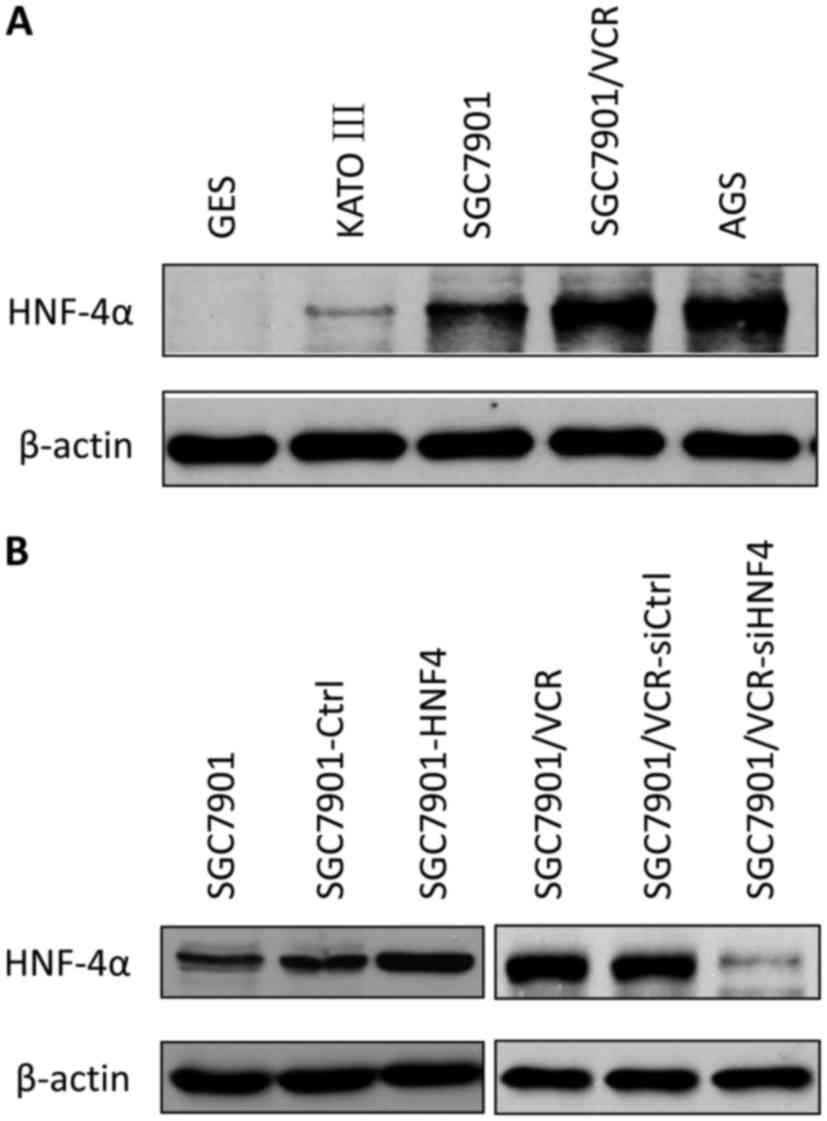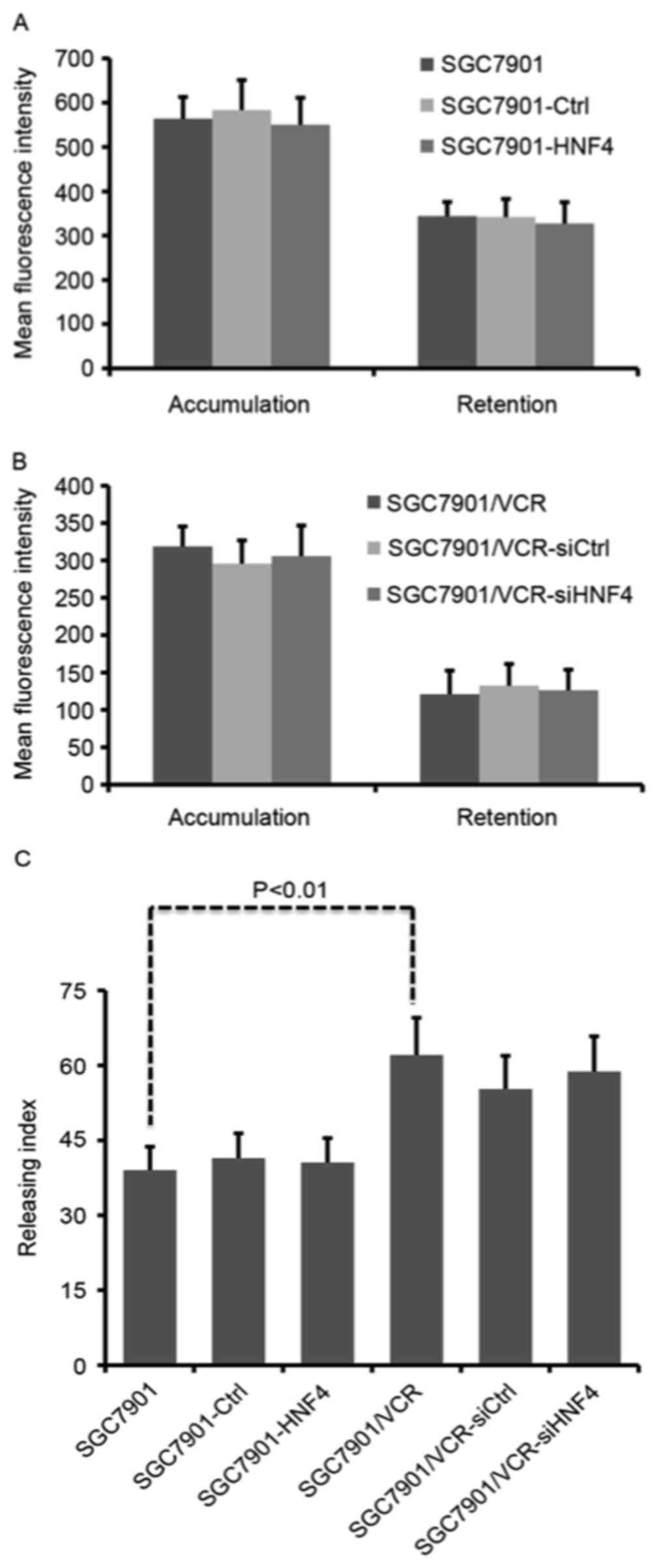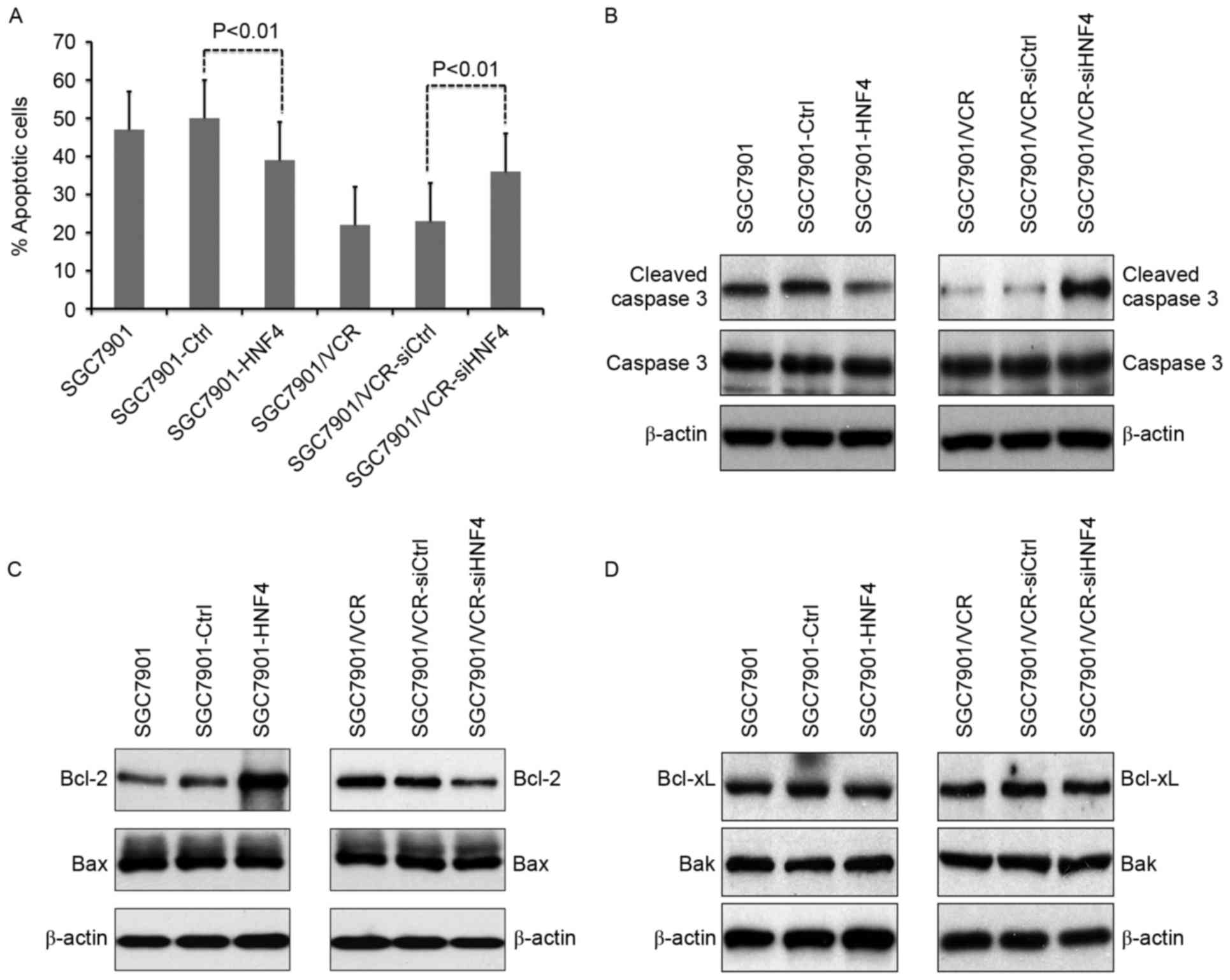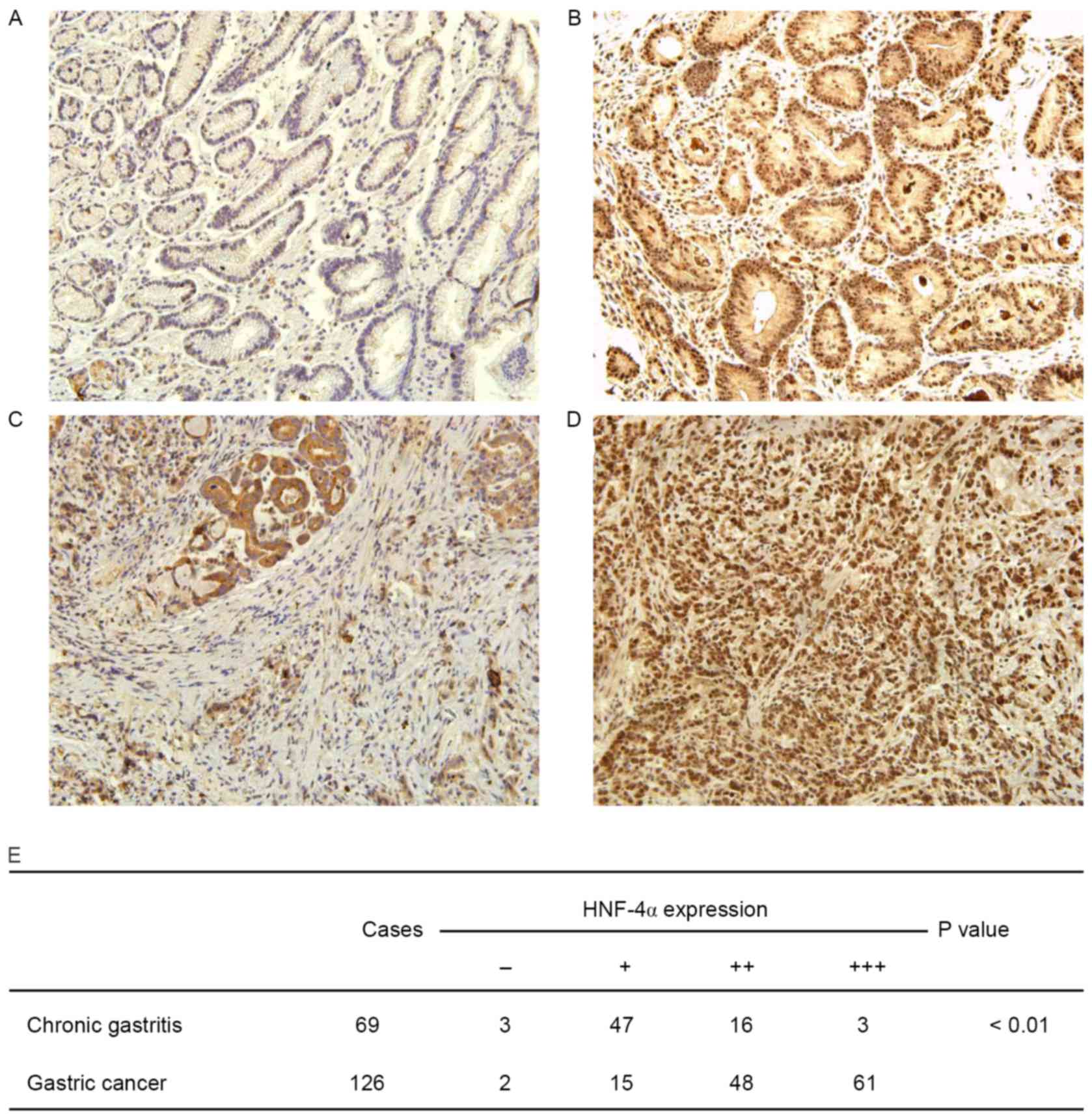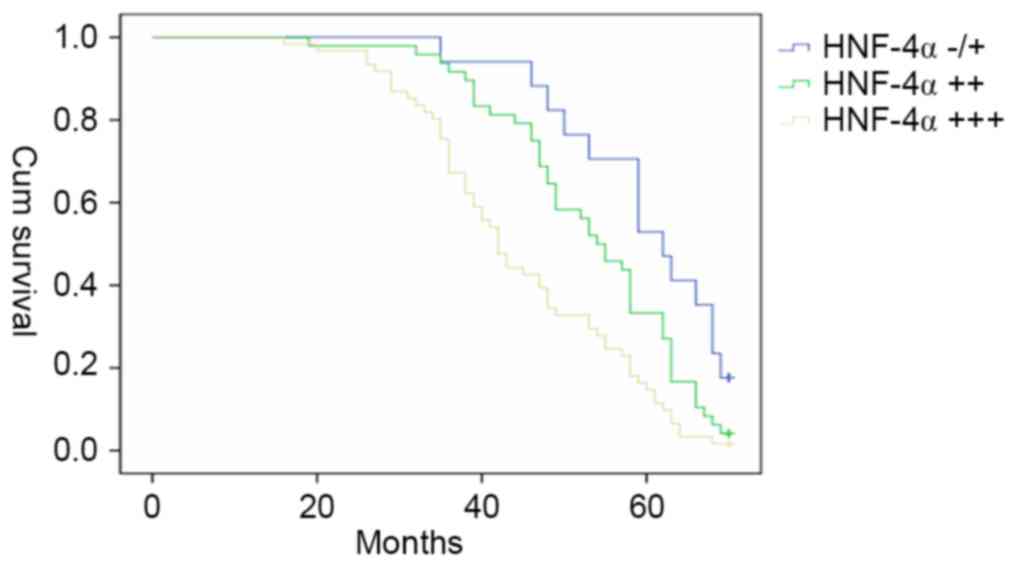|
1
|
Siegel RL, Miller KD and Jemal A: Cancer
statistics, 2015. CA Cancer J Clin. 65:5–29. 2015. View Article : Google Scholar : PubMed/NCBI
|
|
2
|
Fodale V, Pierobon M, Liotta L and
Petricoin E: Mechanism of cell adaptation: When and how do cancer
cells develop chemoresistance? Cancer J. 17:89–95. 2011. View Article : Google Scholar : PubMed/NCBI
|
|
3
|
Noguchi K, Katayama K and Sugimoto Y:
Human ABC transporter ABCG2/BCRP expression in chemoresistance:
Basic and clinical perspectives for molecular cancer therapeutics.
Pharmgenomics Pers Med. 7:53–64. 2014.PubMed/NCBI
|
|
4
|
Elkholi R, Renault TT, Serasinghe MN and
Chipuk JE: Putting the pieces together: How is the mitochondrial
pathway of apoptosis regulated in cancer and chemotherapy? Cancer
Metab. 2:162014. View Article : Google Scholar : PubMed/NCBI
|
|
5
|
Pflaum J, Schlosser S and Müller M: p53
family and cellular stress responses in cancer. Front Oncol.
4:2852014. View Article : Google Scholar : PubMed/NCBI
|
|
6
|
Amelio I and Melino G: The p53 family and
the hypoxia-inducible factors (HIFs): Determinants of cancer
progression. Trends Biochem Sci. 40:425–434. 2015. View Article : Google Scholar : PubMed/NCBI
|
|
7
|
Ozaki T, Nakamura M and Shimozato O: Novel
implications of DNA damage response in drug resistance of malignant
cancers obtained from the functional interaction between p53 family
and RUNX2. Biomolecules. 5:2854–2876. 2015. View Article : Google Scholar : PubMed/NCBI
|
|
8
|
Endo F, Nishizuka SS, Kume K, Ishida K,
Katagiri H, Ishida K, Sato K, Iwaya T, Koeda K and Wakabayashi G: A
compensatory role of NF-κB to p53 in response to 5-FU-based
chemotherapy for gastric cancer cell lines. PLoS One. 9:e901552014.
View Article : Google Scholar : PubMed/NCBI
|
|
9
|
Prabhu L, Mundade R, Korc M, Loehrer PJ
and Lu T: Critical role of NF-κB in pancreatic cancer. Oncotarget.
5:10969–10975. 2014. View Article : Google Scholar : PubMed/NCBI
|
|
10
|
Li F, Zhang J, Arfuso F, Chinnathambi A,
Zayed ME, Alharbi SA, Kumar AP, Ahn KS and Sethi G: NF-κB in cancer
therapy. Arch Toxicol. 89:711–731. 2015. View Article : Google Scholar : PubMed/NCBI
|
|
11
|
Hong L, Qiao T, Han Y, Han S, Zhang X, Lin
T, Gao J, Zhao P, Chen Z and Fan D: ZNRD1 mediates resistance of
gastric cancer cells to methotrexate by regulation of IMPDH2 and
Bcl-2. Biochem Cell Biol. 84:199–206. 2006. View Article : Google Scholar : PubMed/NCBI
|
|
12
|
Zhao L, Pan Y, Gang Y, Wang H, Jin H, Tie
J, Xia L, Zhang Y, He L, Yao L, et al: Identification of GAS1 as an
epirubicin resistance-related gene in human gastric cancer cells
with a partially randomized small interfering RNA library. J Biol
Chem. 284:26273–26285. 2009. View Article : Google Scholar : PubMed/NCBI
|
|
13
|
Su L, Liu X, Chai N, Lv L, Wang R, Li X,
Nie Y, Shi Y and Fan D: The transcription factor FOXO4 is
down-regulated and inhibits tumor proliferation and metastasis in
gastric cancer. BMC Cancer. 14:3782014. View Article : Google Scholar : PubMed/NCBI
|
|
14
|
Liu L, Sun L, Zhang H, Li Z, Ning X, Shi
Y, Guo C, Han S, Wu K and Fan D: Hypoxia-mediated up-regulation of
MGr1-Ag/37LRP in gastric cancers occurs via
hypoxia-inducible-factor 1-dependent mechanism and contributes to
drug resistance. Int J Cancer. 124:1707–1715. 2009. View Article : Google Scholar : PubMed/NCBI
|
|
15
|
Liu L, Zhang H, Sun L, Gao Y, Jin H, Liang
S, Wang Y, Dong M, Shi Y, Li Z, et al: ERK/MAPK activation involves
hypoxia-induced MGr1-Ag/37LRP expression and contributes to
apoptosis resistance in gastric cancer. Int J Cancer. 127:820–829.
2010.PubMed/NCBI
|
|
16
|
Chen F, Zhuang M, Zhong C, Peng J, Wang X,
Li J, Chen Z and Huang Y: Baicalein reverses hypoxia-induced 5-FU
resistance in gastric cancer AGS cells through suppression of
glycolysis and the PTEN/Akt/HIF-1α signaling pathway. Oncol Rep.
33:457–463. 2015. View Article : Google Scholar : PubMed/NCBI
|
|
17
|
Zhou W, Fu XQ, Zhang LL, Zhang J, Huang X,
Lu XH, Shen L, Liu BN, Liu J, Luo HS, et al: The
AKT1/NF-kappaB/Notch1/PTEN axis has an important role in
chemoresistance of gastric cancer cells. Cell Death Dis.
4:e8472013. View Article : Google Scholar : PubMed/NCBI
|
|
18
|
Zhi X, Tao J, Xiang G, Cao H, Liu Z, Yang
K, Lv C and Ni S: APRIL induces cisplatin resistance in gastric
cancer cells via activation of the NF-κB pathway. Cell Physiol
Biochem. 35:571–585. 2015. View Article : Google Scholar : PubMed/NCBI
|
|
19
|
Chen PM, Cheng YW, Wu TC, Chen CY and Lee
H: MnSOD overexpression confers cisplatin resistance in lung
adenocarcinoma via the NF-κB/Snail/Bcl-2 pathway. Free Radic Biol
Med. 79:127–137. 2015. View Article : Google Scholar : PubMed/NCBI
|
|
20
|
Hayashi Y, Wang W, Ninomiya T, Nagano H,
Ohta K and Itoh H: Liver enriched transcription factors and
differentiation of hepatocellular carcinoma. Mol Pathol. 52:19–24.
1999. View Article : Google Scholar : PubMed/NCBI
|
|
21
|
Liu H, Lou G, Li C, Wang X, Cederbaum AI,
Gan L and Xie B: HBx inhibits CYP2E1 gene expression via
downregulating HNF4α in human hepatoma cells. PLoS One.
9:e1079132014. View Article : Google Scholar : PubMed/NCBI
|
|
22
|
Saha SK, Parachoniak CA, Ghanta KS,
Fitamant J, Ross KN, Najem MS, Gurumurthy S, Akbay EA, Sia D,
Cornella H, et al: Mutant IDH inhibits HNF-4α to block hepatocyte
differentiation and promote biliary cancer. Nature. 513:110–114.
2014. View Article : Google Scholar : PubMed/NCBI
|
|
23
|
Schwartz B, Algamas-Dimantov A, Hertz R,
Nataf J, Kerman A, Peri I and Bar-Tana J: Inhibition of colorectal
cancer by targeting hepatocyte nuclear factor-4alpha. Int J Cancer.
124:1081–1089. 2009. View Article : Google Scholar : PubMed/NCBI
|
|
24
|
Kojima K, Kishimoto T, Nagai Y, Tanizawa
T, Nakatani Y, Miyazaki M and Ishikura H: The expression of
hepatocyte nuclear factor-4alpha, a developmental regulator of
visceral endoderm, correlates with the intestinal phenotype of
gastric adenocarcinomas. Pathology. 38:548–554. 2006. View Article : Google Scholar : PubMed/NCBI
|
|
25
|
Supriatna Y, Kishimoto T, Furuya M,
Tochigi N, Ishiguro H, Tosh D and Ishikura H: Expression of
liver-enriched nuclear factors and their isoforms in
alpha-fetoprotein-producing gastric carcinoma cells. Exp Mol
Pathol. 82:316–321. 2007. View Article : Google Scholar : PubMed/NCBI
|
|
26
|
Algamas-Dimantov A, Yehuda-Shnaidman E,
Peri I and Schwartz B: Epigenetic control of HNF-4α in colon
carcinoma cells affects MUC4 expression and malignancy. Cell Oncol
(Dordr). 36:155–167. 2013. View Article : Google Scholar : PubMed/NCBI
|
|
27
|
Nikolaidou-Neokosmidou V, Zannis VI and
Kardassis D: Inhibition of hepatocyte nuclear factor 4
transcriptional activity by the nuclear factor kappaB pathway.
Biochem J. 398:439–450. 2006. View Article : Google Scholar : PubMed/NCBI
|
|
28
|
Roth U, Curth K, Unterman TG and Kietzmann
T: The transcription factors HIF-1 and HNF-4 and the coactivator
p300 are involved in insulin-regulated glucokinase gene expression
via the phosphatidylinositol 3-kinase/protein kinase B pathway. J
Biol Chem. 279:2623–2631. 2004. View Article : Google Scholar : PubMed/NCBI
|
|
29
|
Zhang W, Tsuchiya T and Yasukochi Y:
Transitional change in interaction between HIF-1 and HNF-4 in
response to hypoxia. J Hum Genet. 44:293–299. 1999. View Article : Google Scholar : PubMed/NCBI
|















